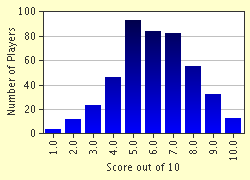Quiz Answer Key and Fun Facts
1. The secret form of voting we term 'ballot', originates from the proper name for an Italian secret religious society.
2. What two word phrase, originally from the Italian, would we use to describe Betty Ford, Dolley Madison or any overly temperamental person who has an elevated sense of ego?
3. The names of several musical instruments come to us from the Italian. One of these is 'piano', which is a shortened form of what original Italian term?
4. Which English word comes to us originally from an Italian exclamation calling soldiers 'to arms!'?
5. The word 'incognito', which is used to describe a person who, for whatever reason, has chosen to hide her/his identity, is Italian for which of the following?
6. American radio personality Rush Limbaugh would be familiar with this English word meaning 'the same thing again', that comes from the word for 'said' in one Italian local dialect. What is this word?
7. Detractors of public officials who choose to caricaturize them might be familiar with this word, from the Italian, which means 'a ridiculous but amusing person'. Which of the following is the Italian-derived term described here?
8. The word 'attack' can be traced back to the Italian 'attacco', meaning, what else, 'an attack'.
9. If you have suffered from an English word derived from the phrase 'broken bench' in Italian, what terrible thing has probably occurred?
10. When many of us think of the Italian language, some of the first terms that come to our minds are the names of various pasta. With this in mind, did the word 'pasta' come to English by way of Italian?
Source: Author
thejazzkickazz
This quiz was reviewed by our editing team before going online.
Any errors found in FunTrivia content are routinely corrected through our feedback system.

